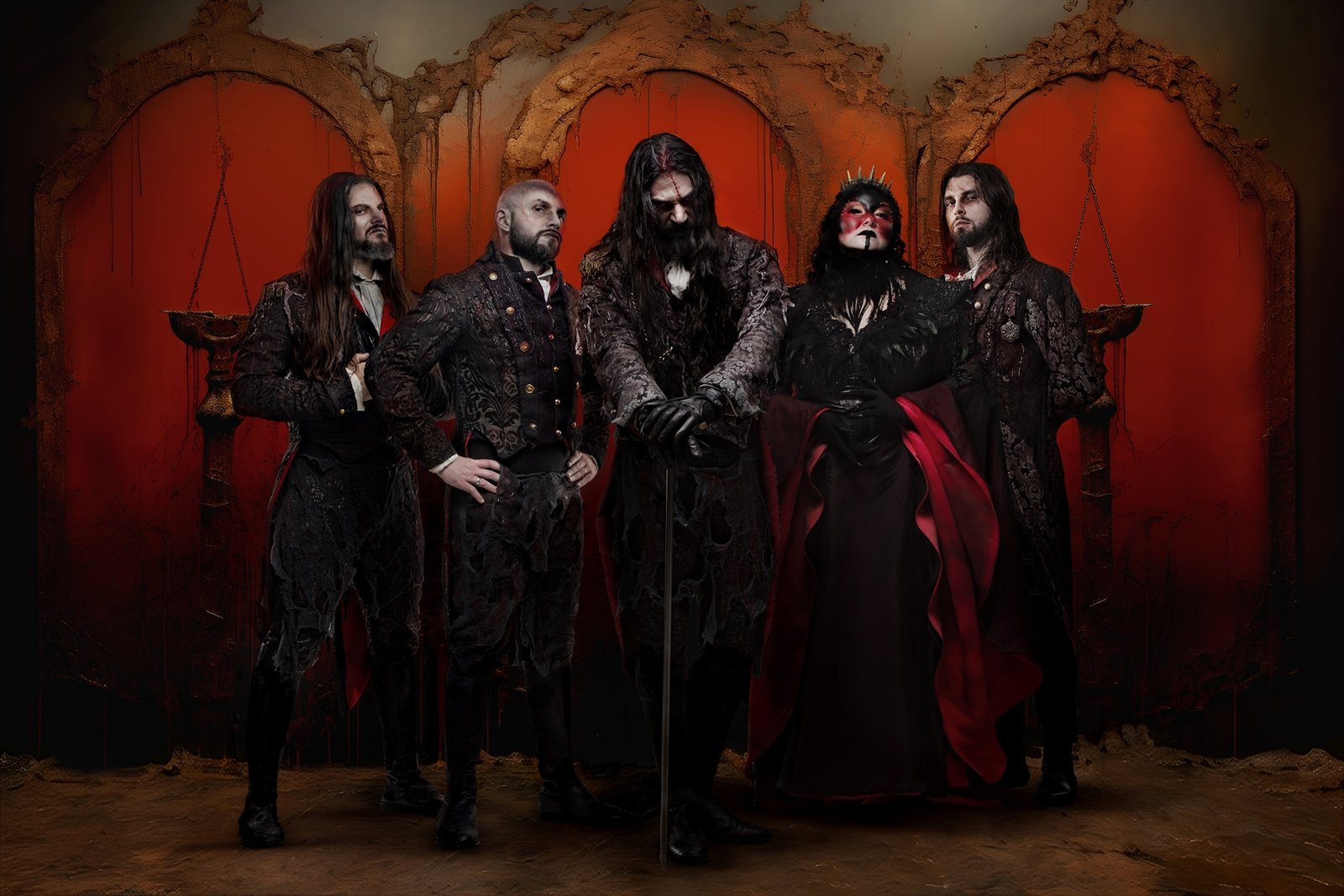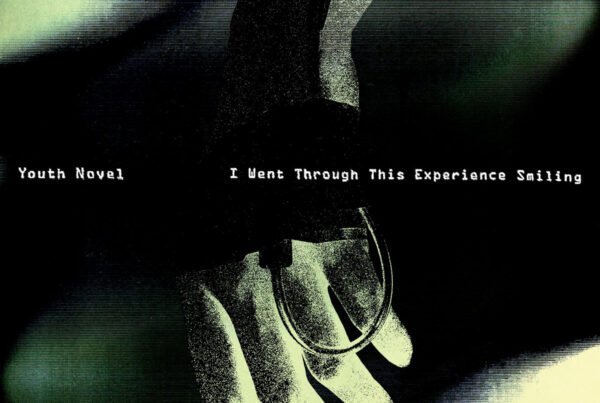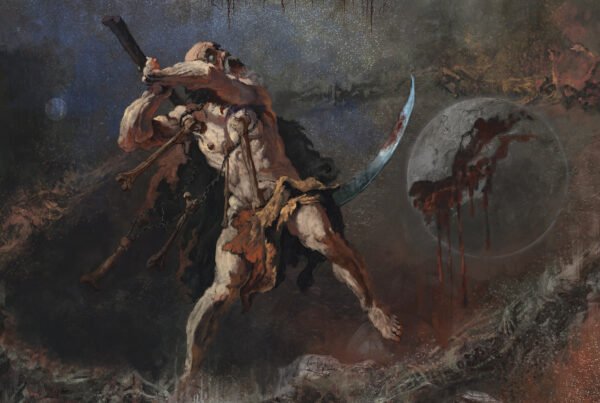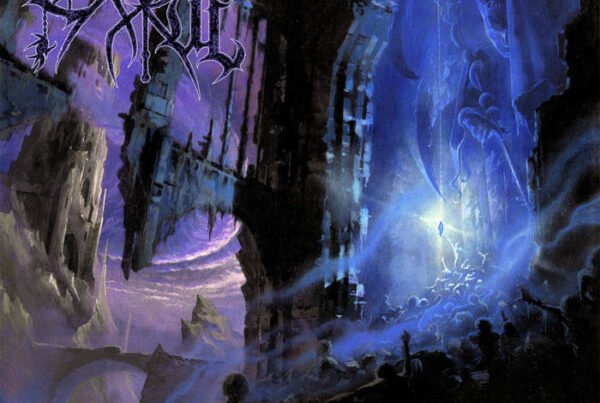Reflecting on a near-death experience, Opera is the most memorable Fleshgod Apocalypse record in recent years, with its increased focus on melodic and technical symphonic death metal.
Release date: August 23, 2024 | Nuclear Blast Records | Pre-order | Instagram | Facebook
Fleshgod Apocalypse – those two words are grandiose in scale, conjuring looming images of divinity and its end. Over the Italian band’s 17 years, the symphonic death metal unit has strived ever higher towards the epic nature of their name. Earlier records like Agony and Labyrinth saw the band exploring their more technical elements while increasingly prioritizing orchestral arrangements. This symphonic, theatrical element reached its zenith on 2016’s majestic King. Veleno (which I reviewed back in 2019) saw the remaining founding member and then-drummer Francesco Paoli return to vocals and guitar while working to strike a balance between their death metal intensity and ambitious orchestrations. And then, Paoli experienced a tragic fall while mountain climbing, resulting in the band announcing a hiatus in 2021. However, this tragedy has not halted their evolution but instead fueled it, leading to the creation of their sixth record, Opera.
If Fleshgod Apocalypse had dissolved so Paoli could recover, they still would have left quite the legacy behind. This impact is evident in the way that the most recent waves of deathcore and melodic death metal seem particularly inspired by the Italian’s grandiose concepts and orchestration, sometimes even tapping pianist/arranger Francesco Ferrini to augment their sound (as you can hear on Shadow of Intent‘s most recent releases and Synestia‘s full-length record).
But tragedy clearly cannot stop this Italian juggernaut. Instead of an entirely understandable retirement, Paoli and company have channeled his tragic accident into the inspiration for the group’s new record, Opera. Paoli explains:
‘Soon after my discharge from the hospital, me and Francesco Ferrini started writing immediately. The idea was to capture the mood of those dramatic days and make sure to keep intact the sense of desperation and fear that was still running through my veins after the accident.‘
The band explores this tragedy from a myriad of perspectives throughout Opera, conveying resilience (“I Can Never Die”) and the fear of looming death (“Bloodclock” and “Pendulum”) in equal measure in their choice of singles. The first of the batch of singles, though placed as the fourth song on the record, is “Pendulum”. This is my favourite song amongst the ten on Opera. The track is slower and groovier than their typical fare, with a riff that lumbers and swings like a hulking giant while a haunting choir establishes an eerie melodic hook. “Pendulum” immediately captivated me with its intro before piano lines and dissonant strings dance around staccato bursts of guitars and drums during the verses. Then, Veronica Bordacchini, now the sole clean singer for the band, uses her operatic soprano to incredible effect as a counter to Paoli’s growls. She heightens the drama of the track that climaxes with a technical burst of neoclassical shredding from both Fabio Bartoletti (guitars) and Ferrini. These flashes of technical wizardry, a testament to the band’s musical prowess, shine throughout the record, especially on “Morphine Waltz”, with its Dream Theater-like unison guitar and piano runs, and the pedal tone runs in the verses of “Matricide 8.21”.
“I Can Never Die” contrasts the tone of the preceding single and opens the record with a sense of victory, reaching some incredible speeds and highlighting Bordacchini during a particularly memorable, operatic chorus that may not be out of place on an Epica record. It becomes clear throughout the singles that the band focuses more on hooky and memorable elements than any of their recent work, harnessing Bordacchini’s vocal prowess to significant effect while incorporating hooks into their dense instrumental arrangements. Her captivating performance on the record’s opener, “Ode to Art (De’ Sepolcri)”, pairs her soprano with a restrained piano, leaning heavily into the record’s namesake style. However, Bordacchini is not just an incredible opera singer (listen to her ascending lines in “At War With My Soul”). She can channel some significant grit into her performance, as you’ll hear on the regal rager “Morphine Waltz”, and her emotional range shines on “Til Death Do Us Part”, which I can only describe as a power ballad.
Fleshgod Apocalypse maximizes their signature juxtaposition of operatic and symphonic beauty against brutal death metal moments on “Bloodclock”. These dynamics also come to the fore on “Per Aspera Ad Astra”, where the latter half of the song has a piano-based bridge that builds with an epic guitar solo before reprising a chorus that goes back and forth between Paoli and Bordacchini, or the restrained-turned-explosive introduction of “Matricide 8.21”. On “Bloodclock”, the listener is first lulled into a false sense of calm with the dulcet tones of a harp and nylon string acoustic guitar before earth-shaking horns and blast beats careen the track towards an epic chorus – one of the highlights of the singles that left me excited to hear the entire record. Paoli speaks and occasionally breathes heavily over parts of the track (and also “At War With My Soul”), which may be a cheesy choice to some, but what kind of theatrical metal doesn’t require a bit of Lactaid?
Opera has the fewest tracks and shortest runtime of any Fleshgod Apocalypse record since their 2009 debut, and two of them are more brief, operatic vocal and piano-based interludes. I appreciate their restraint for such an epic band that is more maximalist than most. Opera maintains the massive sound that Fleshgod Apocalypse pioneered throughout their discography but prioritizes hooks, increasingly polished production, and technical flourishes for possibly their most intentionally memorable release so far. While not every track shines the way the singles do, this album will satisfy existing fans of the band while being poised to bring in many new ones with their refined focus on songwriting and Bordacchini’s incredible range.






